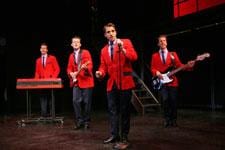The presence of more than 30 musical numbers, one subtly swishy producer/lyricist character and a handful of hunky men singing high-pitched hit songs is my kind of evening.
Short on intrusive narrative, with bouts of history thrown in for naturalistic effect, the current touring production of Jersey Boys is an extremely entertaining piece of concert/theatre that has audiences old enough to know better — and “young” enough to indulge in pure nostalgia — applauding for the first few recognizable bars from cherished songs made popular by the penultimate boy band, Frankie Valli and the Four Seasons. Directed with blockbuster Broadway panache by Stratford director-cum-impresario Des McAnuff, this musical tour de force down memory lane is not to be missed.
A stellar cast, led by Joseph Leo Bwarie as Frankie, soars through each melody with self-assured bravado, requiring them to act, sing, dance a little and make superficial sense of a profoundly complex and vibrant period in the history of popular music. Influenced by vocal-based rhythm and blues forms originating in black American communities, Frankie and his cohorts were among the first to gain global notoriety for the popular, infectious musical stylings that would come to define much of 1950s and ’60s music. Although Valli’s voice has been called everything from shrieking to shrill, one cannot help but be engaged and/or impressed by the sheer energy and celebratory quality of his seamless, powerful sound. Likewise, Bwarie’s rendition of this historic falsetto — moving flawlessly and frequently into more dulcet tones — is a mind-boggling experience as he hits every note with remarkable ease.
Watching Bwarie, a subtle yet decidedly masculine presence following in the footsteps of Valli’s own macho physical presence, warbling girlishly through the lyrics to male-identified ditties such as “Walk Like a Man,” begs the gender question and makes one wonder how this faintly feminized musical odyssey made it so big during a relatively conservative period. Tied up with the mid-twentieth-century penchant for new images and identities that would infuse post-war culture with hope for a bright industrial future, Frankie Valli and the Four Seasons epitomize the astonishing musical diversity of America’s racialized melting pot as it made its way onto the airwaves and into global consciousness.
A group of straight white boys singing love songs remains a popular musical ploy, with notable exceptions such as Elton John, Boy George, Antony and the Johnsons and Rufus Wainwright raising the stakes over the past 50 years with decidedly gayer stage personas. The subtle but significant presence of Bob Crewe, a gay producer/lyricist who is overshadowed onstage by the talent of four straight fellas from New Jersey, is an oddly appropriate, somewhat subliminal, gesture toward the kind of closeted existence that the ’50s and ’60s continued to demand from mainstream artists and performers. Jonathan Hadley’s performance as Crewe subtly tackles the swishy moments with flamboyant grace in a role that could have lapsed into trite stereotypical fare.
Jersey Boys is a high-powered, crowd-pleasing spectacle of the first order. And we come away humming beloved tunes made famous by four gifted straight guys and one brilliant homosexual. How’s that for a gay evening in the suburbs?

 Why you can trust Xtra
Why you can trust Xtra


